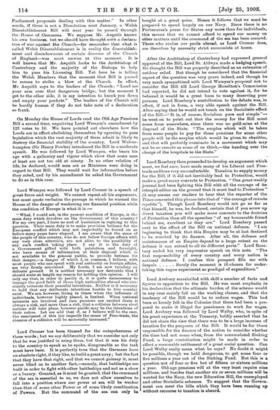Lord Avebury marshalled with skill a number of facts and
figures in opposition to the Bill. He was most emphatic in his declaration that the ultimate burden of the scheme would in any case mainly fall on the working classes, and that the tendency of the Bill would be to reduce wages. This had been so keenly felt in the Colonies that there had been a pro- posal to make it illegal for pensioners to work for wages. Lord Avebury was followed by Lord Welby, who, in spite of his great experience at the Treasury, boldly asserted that he did not share the view that there was to be a large increase of taxation for the purposes of the Bill. It would be for those responsible for the finance of the nation to consider whether the time had not come when, from the accumulated Sinking Fund, a large contribution might be made in order to effect a reasonable settlement of a great social question. Can Lord Welby really mean what be says ? No doubt it might be possible, though we hold dangerous, to get some four or five millions a year out of the Sinking Fund. But this is a question not of four or five but of fifteen or sixteen millions a year. Old-age pensions will at the very least require nine millions, and besides that another six or seven millions will be wanted for the Navy, the new Education Bill, the unemployed and other Socialistic schemes. To suggest that the Govern- ment can meet the bills which they have been running up without recourse to taxation is absurd.






































 Previous page
Previous page